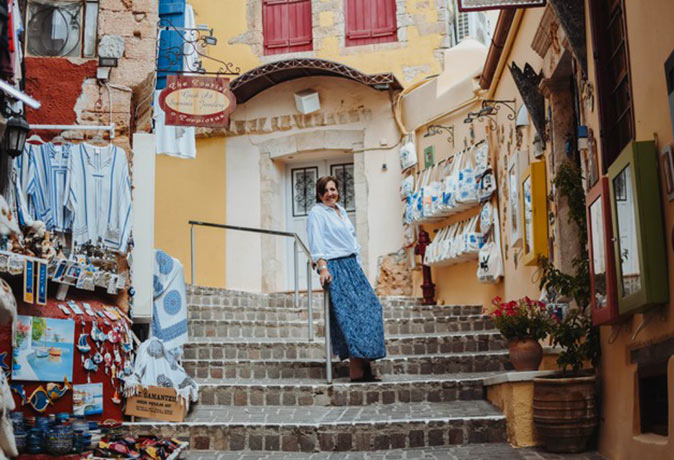Crete, the largest of the Greek islands, is known for its stunning landscapes, rich history, and vibrant culture. Over the years, it has also become a melting pot for expatriates from around the world. The island’s expatriate community is a diverse tapestry of people who bring their unique cultural backgrounds, traditions, and perspectives, enriching the local fabric of Crete. This cultural exchange fosters a dynamic environment where diversity is celebrated, and mutual understanding is deepened. This guide explores how Crete’s expatriate community embraces diversity and the various ways cultural exchanges manifest on the island.
A Mosaic of Cultures
The expatriate community in Crete is a mosaic of cultures from Europe, North America, Asia, and beyond. Each group brings its own customs, languages, and traditions, contributing to a multicultural environment that is both vibrant and inclusive. This diversity is evident in the many cultural events, festivals, and gatherings that take place across the island, where expatriates and locals alike come together to celebrate their heritage.
Cultural Festivals and Events
One of the most visible expressions of cultural exchange in Crete is through festivals and events. The island hosts a variety of cultural festivals that showcase the traditions of its expatriate communities. These events often feature music, dance, food, and crafts from different parts of the world, providing an opportunity for locals and expatriates to learn about and appreciate each other’s cultures.
For instance, the International Festival of Crete, held annually in Heraklion, brings together performers and artists from various countries. This festival celebrates the island’s cultural diversity with performances, workshops, and exhibitions that highlight the richness of different traditions. Similarly, smaller community events, such as potluck dinners and cultural nights organized by expatriate groups, offer intimate settings for cultural exchange and connection.
Language Exchanges and Education
Language exchange programs are another significant aspect of cultural exchange in Crete. These programs facilitate mutual learning between expatriates and locals, helping them to understand each other’s languages and cultures better. Language cafes and tandem language partnerships are popular, where participants meet regularly to practice speaking in different languages. These exchanges not only improve language skills but also foster friendships and cultural understanding.
Educational institutions in Crete also play a vital role in promoting cultural exchange. International schools and universities attract students from various backgrounds, creating multicultural classrooms where students can share their experiences and learn from one another. Additionally, many local schools offer language and cultural courses for expatriates, helping them integrate more smoothly into Cretan society.
Culinary Exchange
Food is a universal language, and in Crete, it serves as a powerful medium for cultural exchange. The island’s culinary scene reflects its diverse expatriate community, with restaurants and cafes offering dishes from around the world. Expatriate chefs and food enthusiasts introduce their native cuisines to the island, adding new flavors and culinary traditions to the local gastronomy.
Cooking classes and food festivals provide further opportunities for cultural exchange. Expatriates and locals come together to share recipes, cooking techniques, and food stories, fostering a deeper appreciation for each other’s culinary heritage. These events often lead to the creation of fusion dishes that blend Cretan ingredients with international flavors, symbolizing the harmonious blending of cultures on the island.
Community Organizations and Support Networks
Community organizations and support networks are crucial in helping expatriates adapt to life in Crete while promoting cultural exchange. These organizations often organize social events, cultural activities, and informational sessions that bring expatriates and locals together. They provide a platform for sharing experiences, addressing common challenges, and celebrating cultural diversity.
For example, expatriate clubs and associations often host cultural workshops, language classes, and social gatherings that encourage members to share their traditions and learn about Cretan culture. These groups also collaborate with local organizations to participate in community service projects, further strengthening the bonds between expatriates and locals.
Impact on Local Society
The presence of a diverse expatriate community has a positive impact on Cretan society. It fosters an environment of openness and inclusivity, where different cultures are respected and valued. This cultural diversity enriches the local economy, as expatriates contribute their skills, knowledge, and entrepreneurial spirit to the island’s development.
Moreover, the interactions between expatriates and locals promote mutual understanding and tolerance, breaking down cultural barriers and stereotypes. By embracing diversity, Crete becomes a more vibrant and resilient community, capable of adapting to the challenges of a globalized world.
Conclusion
Cultural exchanges in Crete’s expatriate community are a testament to the island’s spirit of inclusivity and hospitality. Through festivals, language programs, culinary exchanges, and community organizations, expatriates and locals come together to celebrate their differences and find common ground. These interactions enrich the cultural fabric of Crete, making it a dynamic and welcoming place for people from all walks of life. By embracing diversity, Crete not only honors its ancient traditions but also looks forward to a future of shared understanding and cultural harmony.


